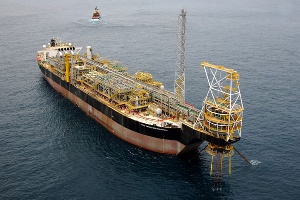There is no doubt that the on-site solution opted for by Tullow Oil will have short term minimal effects on production and revenue losses, however, given that Ghana’s Jubilee oil field still has substantial reserves to recover, there is “the need to have a long term solution,” local energy policy think tank Africa Centre for Energy Policy (ACEP) has said.
“We need to be convinced that short-term economic consideration did not over-weigh technical consideration in the choice of a solution for the FPSO problem,” Executive Director of ACEP Dr Mohammed Amin Adam told Class Business News in an interview in response to a recent announcement by Tullow Oil plc that FPSO Kwame Nkrumah, which operates in the Jubilee fields, will be shut down for between eight and 12 weeks in 2017 as the partners explore measures to find a permanent solution to the vessel’s turret bearing fault.
Tullow, in its recent update, said as previously announced, an issue with the turret bearing of the FPSO Kwame Nkrumah, identified in February 2016, has resulted in the need to implement new operating and offtake procedures.
This necessitated the FPSO be shut down for an extended period in April with production resuming in early May. Since then, Tullow said 18 offtakes to the storage tanker have been successfully completed using a dynamically positioned shuttle tanker.
Tullow said it expects to continue operating the field under these new procedures for the remainder of 2016 and anticipates average gross production to be around 85,000 bopd in the second half of 2016.
According to the oil firm, it has made good progress together with its partners towards establishing the “best long-term solution and, based on the work undertaken over the past four months, now see converting the FPSO to a permanently spread-moored facility, with offtake through a new deepwater offloading buoy, as the preferred long-term solution”.
Tullow said the partners are working with the Government of Ghana to seek their approval for this option.
“The first phase of this work will involve the installation of a stern anchoring system to replace the three heading control tugs currently in the field. This is anticipated to be completed by the end of 2016 and will require short periods of reduced production.
“Tullow then plans a second phase of work to rotate the FPSO to its optimal spread moor heading in the first half of 2017. The work programme covering these phases, which requires Government approval, is expected to cost $100-150 million gross and it is estimated that the Jubilee FPSO will need to be shut-down for 8-12 weeks during the first half of 2017,” the update added.
Tullow said upon completion of the spread mooring work programme in mid-2017, the partners will review opportunities to improve the efficiency of offtake procedures, which may include the use of a larger dynamically-positioned shuttle tanker, and seek to return production to levels seen before the turret issue occurred.
The additional gross operating expenditure of the revised procedures is currently expected to be around $115 million for 2016 and $80 million for 2017.
The oil firm said a deep water offloading buoy is anticipated to be installed in the first half of 2018. “This will remove the need for the dynamically positioned shuttle and storage tankers and the associated operating costs. Market enquiries are currently ongoing to estimate the cost and schedule for the fabrication and installation of this buoy”.
Tullow said it has a comprehensive package of insurances in place. This includes Hull and Machinery insurance, procured on behalf of the Joint Venture, which covers relevant operating and capital costs associated with damage to the FPSO, and Business Interruption insurance for Tullow which covers consequent loss of production and revenue. Claims under both policies have been notified to our insurers.
Preferring suggestion on solving the problem for good, Dr Amin Adam said: “We also call on all political parties to take a long-term view in considering the approval of the option proposed by Tullow Oil or any other option proposed by any anybody, particularly considering that the short-term needs for gas could blight the advantages and benefits of a longer shutdown period to the off-site solution. Tullow Oil must also disclose all relevant information on both options, particularly the cost associated with the off-site option as it did for the on-site option as well as the composition of the technical solution.”
Business News of Tuesday, 5 July 2016
Source: classfmonline.com













